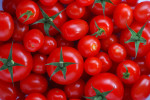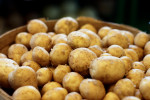
The deadly nightshade family is often blamed for making arthritis symptoms worse but what does the science say?
 People with arthritis, particularly rheumatoid arthritis, used to be told to eat less foods from the deadly nightshade family (potatoes, tomatoes, aubergines and peppers) as a way of reducing symptoms.
People with arthritis, particularly rheumatoid arthritis, used to be told to eat less foods from the deadly nightshade family (potatoes, tomatoes, aubergines and peppers) as a way of reducing symptoms.
But in recent years this thinking has been widely dispelled as a myth. There is absolutely no scientific evidence that suggests that foods from the deadly nightshade family exacerbate arthritis symptoms.
But equally, there is no research concluding that they don’t.
Bearing in mind the wealth of anecdotal evidence – people claiming – that eliminating all (or particular) nightshade foods from their diet has made a fundamental difference to their symptoms, it is surprising that no studies have been done in the area.
What is in deadly nightshade?
The culprit in question seems to be solanine, a poison that plants use to put off predators. Solanine poisoning is real – in large doses it can cause nausea, burning of the throat, irregular heartbeat, headaches, hallucinations, paralysis, fever, hypothermia and even death.
But fear not… the amount of solanine found in food is so small that most experts believe it can’t have an impact on our health. And solanine is not good at being absorbed into the bloodstream, is turned into less toxic compounds and is rapidly expelled from the body. Solanine is also found in blueberries, apples, cherries, sugar beets, okra and artichokes, none of which is in the deadly nightshade family, and none of which we usually hear about in terms of joint pain.
So three reasons not to give up deadly nightshade foods are:
• Solanine has largely been written off by experts as a contributor to arthritis symptoms.
• The items that contain solanine are rich in nutrients and antioxidants, so to ditch them could be bad for the diet overall. For example, red peppers contain an antioxidant called cryptoxanthin that some studies suggest may actually slow down the progression of arthritis.
• Inflammatory arthritis is episodic, getting better and worse from time to time, often for no apparent reason. So if people withdraw from any food and then reintroduce it, just by chance some will experience a flare-up that coincides with the reintroduction.
Yet taking into account that many people with arthritis insist that cutting deadly nightshade – and therefore solanine – out of the diet can make a difference, perhaps it’s worth a try, particularly as there is no research to show that they do not have an impact.
 Plan of action
Plan of action
If you think you’ve seen a pattern emerging between deadly nightshades and your arthritis symptoms, you could consider avoiding them for a period of time.
Speak to your GP or a registered dietitian first as they will help make sure you’re excluding foods completely and check that you won’t be missing any essential nutrients. They may suggest you take supplements to ensure you are getting all the vitamins and minerals your body needs.
To discover if there is a genuine impact, leave out all members of the nightshade family for at least a month, which means reading a lot of labels! Potato starch in particular is in an array of unexpected products.
Then reintroduce the foods to see if they cause a reaction. You should notice a flare-up of symptoms within a few days. Keep a food diary throughout to see if any patterns emerge. If you’ve given up all deadly nightshade plants, consider reintroducing them one at a time, in case one in particular has an effect.
Research in this area is urgently needed. It could be that some people have individual reactions to particular foods and do see an improvement in their symptoms if they eliminate them. Perhaps some of us have genes that make us more susceptible to the effects of solanine, or another component of deadly nightshade plants.
Why wouldn’t experts put deadly nightshade plants to the test in light of all the anecdotal evidence in the area?
Common members of the deadly nightshade family:
• Potatoes
• Tomatoes
• Aubergines
• Peppers (including bell peppers, chili peppers, paprika, tamales, tomatillos, pimentos)
• Goji berries
Wish you’d read this sooner? Subscribe to Arthritis Digest, the UK’s fastest growing arthritis magazine for all the latest arthritis news, reviews and celebrity interviews. You’ll know what your doctor is talking about, what new drugs are in the pipeline and be up to date on helpful products. Hard copy and digital versions both available. Click here for more information.
Text: Iona Walton
Image credits: potato, jamonation; peppers, Tambako The Jaguar
